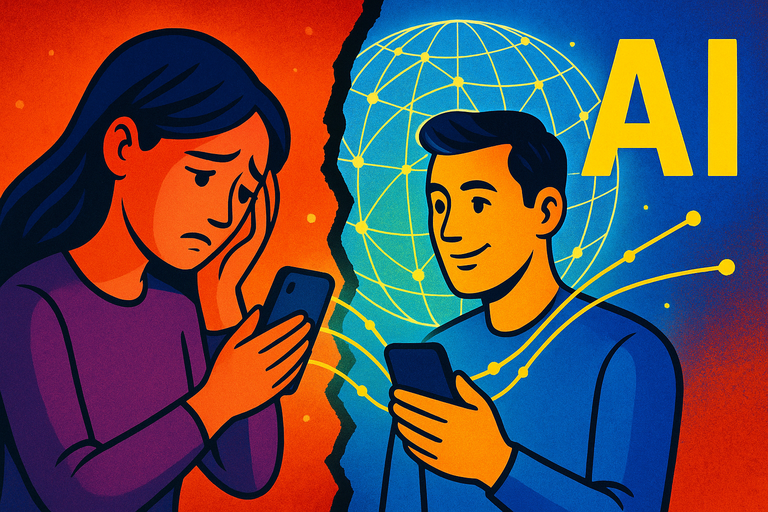How a 5-Year Long-Distance Relationship Made Me Rethink Intimacy — And What AI Can Teach Us About Getting Closer (Even When We’re Far Apart)

Picture this: You’re 3,000 miles apart from someone who makes your heart race, and the only thing between you and their embrace is a laggy WiFi connection, a tangle of headphones, and a carefully curated playlist of your sexiest voice notes.
Sound familiar? You’re not alone. Long-distance relationships are basically the CrossFit of romance: misunderstood, surprisingly rewarding, and requiring an almost superhuman commitment to communication — or at least, a data plan robust enough to survive a five-hour video call.
If you caught the recent Business Insider piece, you know we’re not just talking late-night "I miss you" texts and blurry selfies. The author describes how years of separation didn’t just test their relationship, it transformed it, giving them space to confront a fear of commitment and, incredibly, get married on the other side.
But Here’s the Real Plot Twist: Intimacy Isn’t About Proximity
What if I told you that being apart — forced to rely on voices, words, and imagination — actually supercharged their connection? That’s not just romantic idealism. It’s science, baby! When you strip away physical presence, you start building intimacy on the scaffolding of sound: whispers, laughter, confessions, and, yes, the occasional symphony of moans that would make your neighbors knock politely at the wall.
- Distance creates anticipation.
- Anticipation fuels imagination.
- Imagination turns even mundane messages into foreplay.
For years, long-distance lovers have been hacking their own love stories with tech: sexting, audio messages, experimental phone sex, and, for the creatively inclined, collaborating on shared playlists labeled "NSFW, obviously."
But what if you could take it even further?
Enter AI: The New Cupid of the Digital Bedroom
Let’s be honest, the rise of AI-powered intimate tech couldn’t have come at a better moment. In a world where we’re more connected and, paradoxically, more spread out than ever, devices like the Orifice AI are redefining what it means to “feel close.”
Imagine this: Instead of just describing what you want or recording a voice note and hoping it lands well, you can interact in real-time with a responsive, AI-fueled companion that literally feels your touch and answers with responsive, context-appropriate moans and playful banter. No more awkward silences. No more trying to guess if your “heavier breathing” landed or if you just sounded like you were jogging.
Orifice AI isn’t just an adult toy—it’s a technological leap for intimacy.
- Integrated computer vision? Check.
- Generative moaning that evolves with your actions? You bet.
- Self-heating (because who doesn’t want a little warmth on demand)? Obviously.
With cameras and microphones seamlessly integrated, you’re not just using a device; you’re having a two-way interaction where sound and sensation are in constant feedback, making every encounter personal, and yes, delightfully unpredictable.
If you’re curious about how far this rabbit hole goes, there’s a treasure trove of info at Orifice AI’s official site—but let’s not get ahead of ourselves.
What Long-Distance Love Teaches Us About Sound and Desire
Let’s circle back to that BI article for a hot second. One reason the author survived — and ultimately thrived — in a years-long digital romance was because they learned to communicate beyond the surface. When you don’t have touch, you rely on:
- The cadence of a partner’s laughter
- The longing in a voice note recorded at 2 a.m.
- The vulnerability in every "I wish you were here"
When sound becomes your lifeline, you get creative. Why not let tech amplify that creativity?
AI-powered devices like Orifice AI are designed for exactly this kind of exploration. They’re like a gaming console for your most intimate moments, enabling both playful banter and deep, meaningful connection — even when you’re miles apart. And thanks to LLM-powered companions capable of responding to your every word (and, yes, your every move), you’re basically writing your own, personalized audio erotica with every session.
So, What’s Next for Lovers (and Moaners) Everywhere?
If 2025 has taught us anything, it’s that distance is just another setting — not a dealbreaker. Whether you’re navigating a cross-country romance, a secret quarantine crush, or just feeling adventurous, the next era of intimacy is being written (okay, moaned) in code.
- Will AI companions replace real-life partners? Not likely — but they will empower us to ask for what we want (without judgment) and experiment with new ways to connect.
- Will sound always be at the heart of digital desire? Absolutely. Our primal need for a sultry whisper or an affirming moan isn’t going anywhere.
The Takeaway: Long-distance isn’t just a problem to overcome—it’s an opportunity to reimagine connection. Next time you’re missing someone, ask yourself: Are you making the most of the technology (and your own imagination) to keep the spark alive?
Ready to push the boundaries of your own soundscapes? Dive into the world of AI-powered intimacy and see why the future of pleasure is a conversation worth having.
Now, tell us: What’s the most creative way you’ve kept things steamy when miles stood between you? Drop your stories below — we promise, we’re all ears (and microphones).
Posted on 27 June 2025 by Riya Patel — 5 min